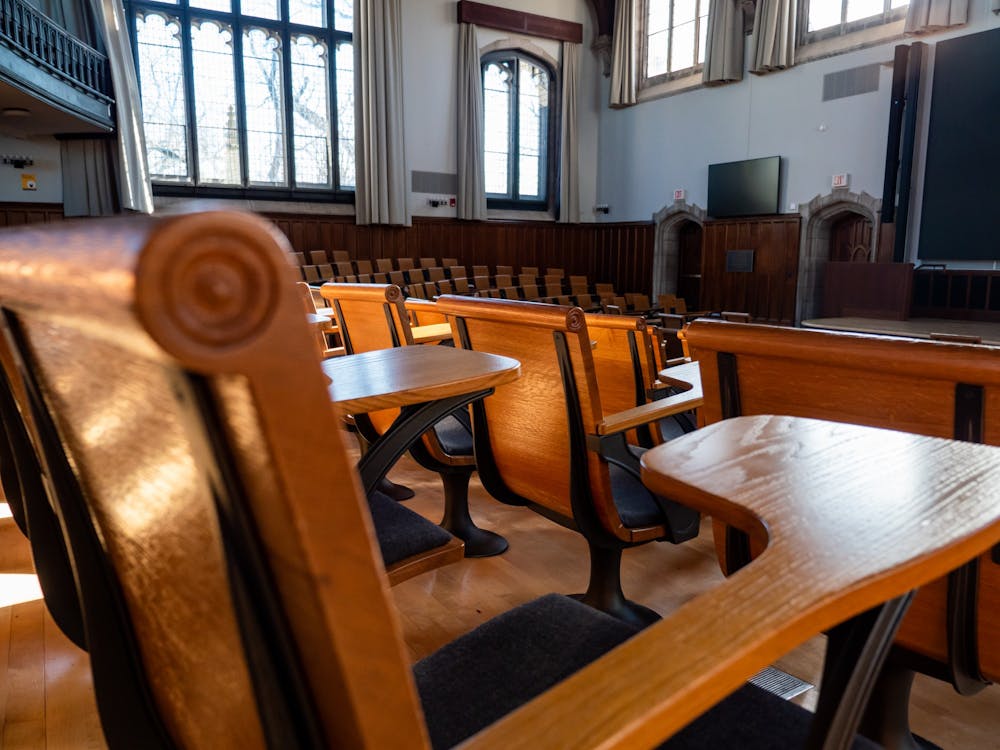This week, the stalls of Firestone are full and campus is focused as students are preparing for the end of the semester and the ever-approaching finals period. In an attempt to improve the student experience around this time of the semester, on Feb. 16, Dean of the College Jill Dolan sent an email to the undergraduate student body announcing a pilot final exam schedule for the Spring 2024 semester. According to Dolan, this schedule allows “students to sit for up to two exams in a day, which will facilitate a more efficient exam period.” Ideally, this pilot schedule would help shorten the exam period in the spring, enabling students to finish the semester earlier, something that students were concerned about, according to the email. But this exam schedule has the potential to be detrimental both to students’ academic achievement and mental health during the exam period. Students’ wellbeing and academic success should take priority over efficiency — the University should maintain the old final exam schedule.
The new final exam schedule is harmful because it permits students to take up to two exams a day. The previous schedule allowed students to request a time change when they had more than one exam on the same day. Final exams can last up to three hours, which means students may sit for six hours of testing in one day. Although Dolan cited “efficiency” as the reason for the change, the exam period is still the same number of days, which will make it more stressful without shortening the semester for many students. This schedule thus imposes a higher burden on students, which could lead to worse academic performance and negative effects on mental health. This year, however, even during the pilot, most finals are offered towards the end of the exam period, thus not truly shortening the semester for many students.
Exam season takes a toll on students. Students tend to feel fatigued after taking exams, often because they spend so much time in preparation. Furthermore, many students sleep less and experience worse sleep quality during an exam period. Since sleep is important to retaining information, lack of sleep can also contribute to poor exam performance. Taking multiple exams on the same day is more likely to affect academic performance, especially considering that students may be more fatigued, and mentally exhausted, during the second exam.
But there are even more concerning ramifications of a packed exam schedule. Nationwide trends demonstrate that feelings of stress and anxiety in college students already increase during exam periods. While a healthy amount of stress has shown to be beneficial, as it encourages students to prepare diligently, stress becomes concerning when these feelings escalate to serious depression and anxiety. Discussions surrounding academic rigor and its effect on student mental health are common on campus, and have often graced the pages of the ‘Prince.’ The proven relationship between exam season and dangerously high stress levels, and exam season’s potential to exacerbate existing mental health issues, makes Princeton’s pilot exam schedule particularly worrisome. Increasing the number of exams that students can take per day could add to the higher rates of depression and anxiety in college students, something that the University must do more to prevent. This proposal moves progress on mental health backwards, subjecting students to an increasingly stressful finals period, compounding Princeton’s academic rigor.
If the University truly wants to allow students to leave campus earlier in the spring semester, without compromising academic success and student mental health, it should consider beginning the semester earlier and extending it. As argued recently in the ‘Prince’ by columnist Julianna Lee ’25, Princeton has a notably short semester relative to the average U.S. college semester. Princeton also starts later compared to other colleges in the Ivy League. For example, the spring semester at the University of Pennsylvania started January 18, while the spring semester at Princeton started January 25. Their last day of classes was May 1, while Princeton’s last day of classes was on April 26. The 11-day difference between the lengths of semesters demonstrates the potential of an earlier start to the semesters. One of the University’s cited reasons for this policy change is to end the semester sooner. If that is truly the University’s aim, beginning the semester earlier would be a more sustainable way of achieving this goal than creating a more stressful exam schedule.
This new exam schedule has the potential to negatively affect the undergraduate student body. As student feedback from the pilot is received, the University must listen, recognize concerns, and act accordingly. Should the policy be unpopular (which is likely), the University should reinstate the previous final exam policy. Princeton’s academic rigor is one of the institution’s greatest assets, but there is no need to make it harder than it already is.
Liz Reyes is a first-year contributing columnist planning to concentrate in SPIA. She is from Cherry Hill, N.J. and can be reached at lizbeth.reyes[at]princeton.edu.








